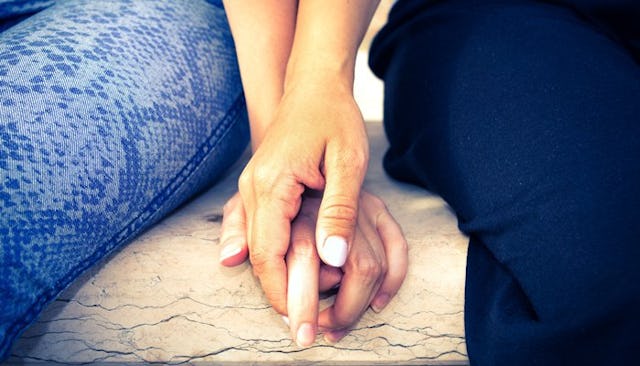What You Should And Shouldn't Say To A Friend Who Miscarried

The first time I had a miscarriage, I remember my phone ringing off the hook. I was swamped with condolences and well-meaning messages.
I had never felt more alone.
I appreciated the thoughts and support from friends and family, but what I wanted was to vent. I wanted to be angry. I wanted someone—everyone—just to listen to me.
What I got was unsolicited advice and commiserations (with a few notable exceptions).
I learned something valuable during those days. When a friend is grieving the loss of an unborn child, there are things that you just shouldn’t say. Here are a few things that should never come out of your mouth towards a friend who miscarried, and some pretty good alternatives.
DON’T SAY: “I’ve been there.” Well, hooray for the Miscarriage Club! Seriously? No, you haven’t been here. Maybe you had a miscarriage, too, but you’re not living my life. You have no idea how this will affect me.
SAY THIS: “I remember when I had my miscarriage…” It’s a gentle lead-in, and allows you to share your experiences without encroaching on mine.
DON’T SAY: “It’ll get better.” You can’t promise that. Maybe it got better for you. And maybe “better” is subjective.
SAY THIS: “It got easier for me.” I really do want to hear that it got easier. I want to know what you did to recover from this loss. I want hope that I’ll eventually find some semblance of normal. Just do it without making empty promises, because I can’t handle that.
DON’T SAY: “You’ll have another baby.” Gee, thanks! I had no idea that babies were so easily replaced. Had I but known that this baby shouldn’t mean so much to me, I’d have stopped crying immediately. WHAT THE HELL?
SAY THIS: “…” That’s right. Say nothing about having babies in the future. I’m still dealing with the one that just died inside my body. My future has collapsed around me. Focus on the problem at hand and stop borrowing trouble.
DON’T SAY: “You weren’t that far along, so it’s not like it was even a baby yet.” Hey, asshat, guess what? You don’t get to decide when I become emotionally attached to the child in my womb. The split second that I became pregnant, I became a mom.
SAY THIS: “I’m sorry for your loss.” That’s what it is. I’m grieving the loss of a child that I never even got to hold. I’m grieving for the family that will never exist with that little person in it. I’m grieving, not just the pregnancy, but the birth and the birthdays, the life that will never be.
Women handle miscarriages in a variety of ways. The best way to help them is to listen, first and foremost. If, after that, you still feel the need to speak up, be empathetic and loving, and remember what not to say.
Related post: The Invisible Moms’ Club
This article was originally published on